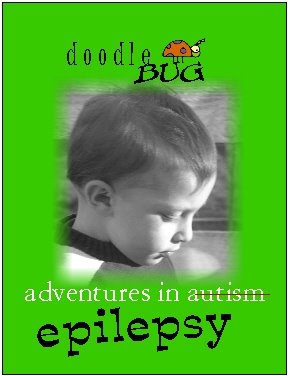I keep getting asked about Epilepsy and the Doodle's diagnosis and prognosis. What it means, what he has, how long he'll have it, what caused it? The bottom line is we do not know, nor do the doctors. I took this description of epilepsy off of the Epilepsy Foundation's webpage. I think I mentioned, this is my new past-time; reading about seizures and the causes of seizures; plus, I'm too depressed to try and be funny, clever or deep today.
Causes of Childhood Epilepsy
Epilepsy is a disorder of the brain.
A child's brain contains billions of nerve cells. They communicate with each other through tiny electrical charges that fire on and off in random fashion. When some or all of these cells suddenly begin to fire together, a wave of electrical energy sweeps through the brain, causing a seizure.
Seizures interfere with the child's normal brain functions.They produce sudden changes in consciousness, movement, or sensation.
Some people use the term "seizure disorder" instead of "epilepsy" to describe this condition. Both mean the same thing -- an underlying tendency to experience seizures.
Having a single seizure does not mean a child has epilepsy -- epilepsy is the name for seizures that happen more than once without a known treatable cause, such as fever or low blood sugar.
Often Starts in Childhood
While epilepsy can begin at any time of life, fifty percent of all cases begin before the age of 25. Many start in early childhood.
One reason is that immature brains are more susceptible to seizures from any cause.
Possible Causes
Pinpointing the cause of epilepsy is difficult at any age. In seven out of every ten cases, there is no known cause and they are labeled as having idiopathic epilepsy. "Idiopathic" is a latin word meaning "of unknown cause."
There are many possible causes in children. These include problems with brain development before birth; lack of oxygen during or following birth; a head injury that leaves scaring on the brain; unusual structures in the brain; tumors; a prolonged seizure with fever, or the after-effects of severe brain infections such as meningitis or encephalitis. When a cause can be identified, these children are labeled as having symptomatic epilepsy. The seizures are felt to be a symptom of the underlying brain injury.
Subscribe to:
Post Comments (Atom)
























No comments:
Post a Comment